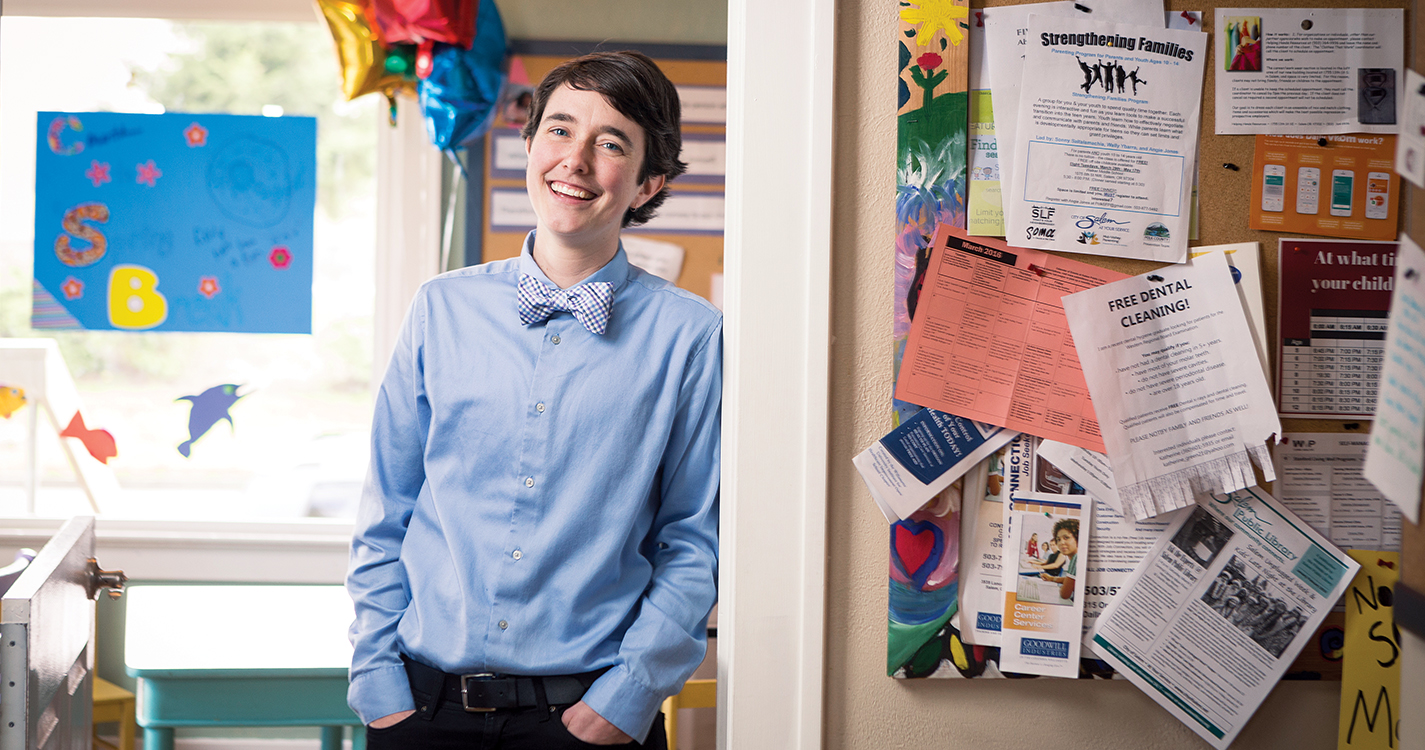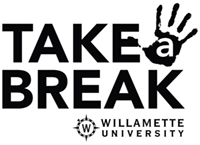
Since 2001, the TaB alternative break program has worked to send groups of Willamette students to cities and regions around the nation with the goal of engaging them in community service and experiential learning. If ever there was a way to burst the “campus bubble” this has proved to be it — spending spring break in a place outside students’ comfort zone, living and working in communities beset by poverty, racial inequity, illiteracy, food insecurity, marginalization of immigrant groups, homelessness, HIV/AIDS, environmental destruction and more.
The program is coordinated by the university’s Office of Community Service Learning, but it’s been student-led from the start. Take a Break leadership teams propose their own trip topics, destinations, educational materials, learning outcomes and classroom agendas. They also create itineraries; set budgets; arrange transportation, food, and lodging; recruit participants and raise funds to help cover the costs of their trips. Leaders and participants take part in extensive volunteer events leading up to the one-week service trip in March, and about 30 hours of reflection per student during and after the trip. It’s intense and demanding — far from “volunteer tourism.”
Along with other campus-based community engagement efforts, Take a Break has helped Willamette University be recognized with the 2009 Presidential Service Award (the highest federal award of its type) and included with distinction on the 2012 Presidential Honor Roll for Community Service. But most importantly, TaB has had an immeasurable impact on the lives and careers of those who embrace its motto of Community, Justice, Service, Simplicity.
Here, four TaB alumni share how the program changed their careers and lives.
Mikki Trowbridge ’07, MBA ’08

She finds it humorous now, but when Mikki Trowbridge started at Willamette in 2003, she had her life all planned out. She was going to major in economics, get a joint MBA and law degree, and then work as a corporate lawyer. A spring break trip to Philadelphia changed her life completely — something Trowbridge also laughs about today.
“Take a Break changed my trajectory and purpose in life,” she says. “All because I was lured in with a $35 trip!”
Trowbridge and her group were sent into areas where poverty, homelessness and mental illness were stunning not only in scale but in lack of access to services. Her “Aha” moment came when she realized the same issues were taking place in the city of Salem and in the hometowns of every member of her service team.
“I didn’t want to return to a life where I was turning a blind eye to hardship and not being active in my community,” she says. “My experience in Philadelphia made me realize a core piece of who I am and that my purpose in life revolves around helping others — and by keeping that as a priority I could make a career out of it.”
The TaB program came to dominate Trowbridge’s experience at Willamette. She served as a trip leader to New York City in 2005 and was TaB’s program director for three years, from 2006 to 2008. She spent eight years in the nonprofit field after graduation, launching HandsOn Mid-Willamette Valley, a Salem-area volunteer center; directing alternative break programs through United Way Worldwide; and fundraising for Boys & Girls Club. She credits TaB with providing a solid foundation for her lifelong calling: “It was my first real service experience, my first venture into nonprofit work, my first time leading a team, and my first time running a business or organization, managing budgets and raising money.”
Trowbridge is now the owner of Mikki Trowbridge Yoga in Salem. When people think of service-centric professions, yoga instructor doesn’t typically come to mind, yet Trowbridge’s love of yoga and helping others proved to be a perfect fit.
“I didn’t feel good about becoming a full-time yoga instructor unless I could incorporate a service component,” she says. While she taught at studios in the Salem area and hosted Yoga + Beer events at breweries around the state, Trowbridge didn’t make her jump from nonprofit work to full-time yoga until landing a contract with Oregon State Hospital.
“Yoga can be a big help to people suffering from mental illness,” she explains. “One of my students worked at the state hospital, and she told me they wanted to bring in a contractor to focus specifically on yoga for patients. That was the final piece of the puzzle for me. The service component was there.”
Trowbridge now teaches morning yoga classes to patients. She emphasizes reconnecting mind and body through meditation, breathing techniques and finding the ability to sit quietly with oneself.
“For some patients that’s really hard, so sometimes the classes just serve as a quiet, safe place, since the hospital setting and, quite often, their own bodies and minds don’t provide this,” she says. “We give them a space to take some self-control back, and hopefully give them some skills for dealing with life: how to stay calm in anxious moments, or how to pull back when they can tell they’re about to get angry.”
In weaving together the importance of service as well as professional gratification, Trowbridge often remembers the Willamette motto, Not unto ourselves alone are we born.
“It’s a beautiful motto for a university, but also a beautiful motto for life,” she says. “We made it a big part of TaB every year, a way to point out the importance of focusing on others, even when you have a mortgage and a job and a family after leaving Willamette. Not everyone needs to travel across the county to serve, not everyone needs to volunteer every week, but anyone can find personal ways to give back.”
Jill Summers ’05
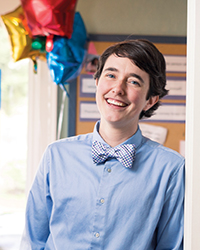
Jill Summers got in on the ground floor with the Take a Break program, spending a week volunteering at a Catholic Worker house in Tacoma, Washington, in 2002 — TaB’s inaugural trip.
Summers’ second trip was to Chicago, to learn about service programs in urban areas. By the time Summers (who prefers gender-neutral pronouns) entered their junior year at Willamette in 2004, they were eager to serve as a team leader on a trip to Jonestown, Mississippi — or so they thought.
“It was really, really hard,” Summers says now, recalling an experience that often left them shaken, riddled with self-doubt, and struggling to deal with being thrust into an environment where they were no longer part of a racial or socioeconomic majority.
“I balked at first when I realized we were spending our week in a poor black community,” Summers says. “I went to an inner-city middle school in Tacoma, and as a white person I was more of a minority there. The thought of putting myself back into that situation triggered some feelings I thought I was finished with, so I was uneasy, uncomfortable. My feelings were, ‘What if this is something inside that I can’t help and it won’t go away? What if I just suck as a person?’”
Looking back now, Summers admits embarrassment about “the ignorant, borderline-racist entries in the journal I kept during the program. But I’ve learned so much in the last ten years and don’t still think like that. I’m proud of my growth.”
Summers’ uneasiness melted while working in the Jonestown community and attending church services, but the week was fraught with hardship and discord within the TaB group. The students questioned why they were just painting houses and building a fence when they were surrounded by grinding poverty and suffering. To make matters worse, a cousin of one of the Jonestown residents they were working with was injured in a shooting.
“The shooting hit everyone really hard,” Summers says, “and I just didn’t know how to help people process that at the time.”
After the trip, Summers learned another difficult lesson when some of the students’ reflection evaluations criticized Summers’ preparedness and leadership. “That was instructional to me, moving forward with my life. It was painful, but we really were unprepared,” Summers recalls. “That trip brought home to me how ineffective it could be to try to solve the problems of a group from the outside, without having an understanding of the problems, the culture or the part you play in the mess.”
Since graduating with a sociology degree, Summers has worked in various social service positions, first as an AmeriCorps patient advocate at a cancer resource center in Mendocino, California, and now as program coordinator for Salem Interfaith Hospitality Network (IHN), working primarily with families who are experiencing homelessness. Summers is also entering the final term of a master’s degree in social work at Portland State University.
“I think I’ll probably be in social work my whole life,” Summers says. “It’s near and dear to my heart.”
The past 12 years have provided time for reflection, and Summers sees the importance of what TaB does best: giving students a look at real-world problems, unfiltered by media or preconceived notions.
“The actual work that students do tends to be surface-level stuff,” Summers explains. “It helps, it does good, but that’s not where long-term, sustainable change happens.”
To that end, Summers recently hosted six Willamette first-year students at IHN, teaching them about barriers many people face when they lose their homes and engaging the students directly with families served by the shelter.
“If I can instill a passion for social justice in Willamette students — or anyone really — that’s where I can further the Take a Break spirit,” Summers says. “In Jonestown, we didn’t talk about the big picture, and I didn’t have the leadership skills or critical understanding to help others do that, let alone myself. So maybe now I’m trying to make up for that.”
Erik Willis ’10
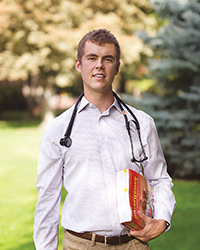
Majoring in biology at Willamette, Erik Willis spent much of his time conducting medical research, a primarily solitary pursuit that extended into his post-graduation career at a biotechnology startup in San Francisco.
He credits TaB with tempering the focus that easily leads to a separation from campus and other communities. “You can get so insulated, and not interact with people in that type of environment,” he says. “I really missed the interpersonal communication that I discovered on Take a Break, so I decided being a doctor would be more in line with my values than the medical research business.”
Willis heard about TaB through word of mouth but didn’t decide to sign up until his senior year in 2010. He chose a trip to New Orleans, where his skills would help with repairing homes damaged by Hurricane Katrina in 2005.
He’d never been to the South, and he thought New Orleans would be interesting and get him out of his comfort zone. What awaited Willis’ group in New Orleans was devastation and misery still apparent five years after Katrina uprooted more than one million people, who scattered to states across the U.S. and often never returned to the city.
“It was quite a shock, as there was still so much to be done,” he says. “Reading about it is one thing, but when you’re there you see houses that haven’t been touched, you hear stories about wealthier homeowners buying out lots next to theirs and then building bigger houses. I’d never seen anything like that before. And being in the South — a new culture — was pretty jarring.”
Willis’ group spent the week repairing a house for a couple who lost their home and had been living in a FEMA trailer since the storm. The husband had been diagnosed with cancer at the time Katrina hit.
Willis says he felt humbled to hear that and many more stories. “They just wouldn’t give up,” he recalls. “They wanted to rebuild.”
While relaxing outside the house after work was completed one day, the volunteers were introduced to a couple next door who were also struggling. “We asked them if we could do anything for them and they said they could use some help painting their apartment,” he says. “We hadn’t planned on it but we went in and helped them paint, and they ended up making a huge dinner for us that night — the whole group, people they didn’t even know. On both sides, it was really a very positive experience.”
Most of Willis’ energies these past several years have been taken up by applying to medical schools. He quit his job in biotech to take science courses and study for the MCAT this past year, and he plans to take an EMT course and then work as an emergency medical technician before getting into medical school.
He credits his TaB experiences for his desire to practice medicine in rural, underserved communities, something he may not have thought about if he had chosen to stay put on the Willamette campus.
“Knowing those people’s stories and struggles drives me to help as a physician in the community,” he says. “Visiting a place like New Orleans made me realize how much need there is right under our noses.”
R.E. Buckley ’12
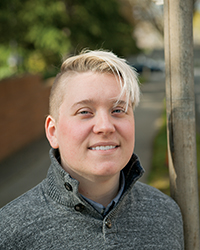
You could say R.E. Buckley was destined to a life of service. Proof can be seen in Buckley’s four years at San Jose’s Notre Dame High School, founded by the Sisters of Notre Dame de Namur (“who were strong, focused on social justice and got things done,” says Buckley). Next came stints at Willamette as a community service learning coordinator and Take a Break leader, followed by experience as a Teach for America Spanish teacher in Jackson, Mississippi.
But such a simple statement would overlook a fundamental change that has taken place in Buckley’s conception of service.
“I think about equity a lot more now, and power,” says Buckley. “At the time I worked with TaB I didn’t fully understand the power I held as a Willamette University student — the ability to say ‘Hey, this trip sounds nice, I’ll get to work with new people for a week and learn about their issues and then I can move on.’ To me now, the term ‘service’ connotes ‘I’m doing you a favor, I’m coming from a place from above and bringing something to you.’ I’ve learned to think more about how to use the power I have to make change, and the spheres of influence I can access that others can’t.”
That uneasy relationship between volunteers and people they serve wasn’t lost on Buckley’s TaB coordinators, who encouraged their group to work through the inevitable discomfort they felt on service trips to places like Sisters of the Road Café and Blanchet House of Hospitality in Portland, Oregon.
“When you first recognize the privilege you’ve grown up in and the things you’ve gotten based on your skin color and class status, it’s shocking because you’ve had the privilege of ignoring it for so long,” says Buckley. “Our TaB leaders constantly challenged us to take that discomfort and sit with it and think about it, to recognize that you’ve been on the receiving end of a system that’s favored you in a lot of ways. It was uncomfortable but it was definitely something that has stuck with me since then.”
Buckley (who prefers gender-neutral pronouns) sees their time since graduation from Willamette as a constant growing process, trying to understand where they need to put their efforts in building equality. “I believe in educational equity,” says Buckley, “but I question having done Teach America, going to Mississippi to teach Spanish. While I built relationships with my students, on a systemic level I think I was part of a revolving door of teachers who come and go.”
In addition, Buckley earned a master’s degree in public administration at Syracuse University and completed a Hatfield Resident Fellowship with Clackamas County Emergency Management, where they developed a white paper on the Americans with Disabilities Act’s impact on emergency planning and policy. All the while, they have been drawn to opportunities aligned with TaB’s principles of equity and social justice.
Buckley is now a research assistant at the Providence Center for Outcomes Research and Education in Portland, which focuses on improving the health of underserved populations. “We do health care policy research with a focus on social determinants of health — such as living environment, social structure and culture — and how they impact specific communities disproportionately,” says Buckley. “Something as simple as filling out a form for a job or social services becomes an access barrier when you don’t have stable housing.”
Buckley’s advice to current Willamette students and TaB participants? “Try not to be defensive about your position of power, and don’t assume that we all have the same identities. We hold both privileged identities and oppressed identities simultaneously, and that doesn’t make one greater than the other. Be open to hearing people’s stories and also think about how you can build relationships that go beyond just the week you spend in your communities.”
Marc Covert is a freelance writer in Portland.
This article originally appeared in the fall 2016 issue of Willamette, the magazine of Willamette University. Published by University Communications, Willamette features stories and conversations that help alumni and friends stay meaningfully connected to the university.
Does this article inspire your own TaB memories? Share them at magazine@willamette.edu.


